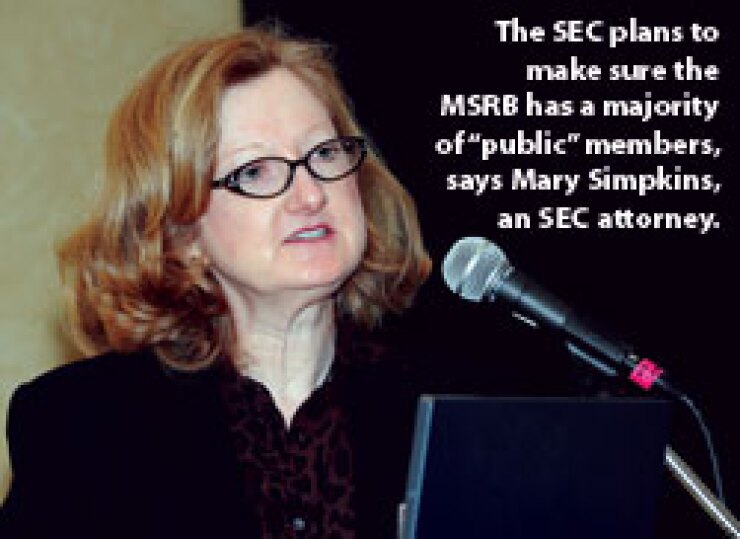

NEW YORK CITY — The Financial Industry Regulatory Authority is conducting an inquiry into “flipping” and the Municipal Securities Rulemaking Board is too aligned with dealers and needs more public members, regulators said here yesterday.
At the Securities Industry and Financial Markets Association annual legal and compliance conference, Malcolm Northam, FINRA’s director of fixed-income regulation, announced that FINRA is conducting an informal look at new-issue retail order periods, to address concerns about the potential for flipping.
Flipping occurs when dealers or institutional investors purchase bonds and then immediately resell them to retail investors at a higher price.
The inquiry was partly prompted by questions about a large California bond sale earlier this year.
The bond sale was oversubscribed during the retail order period, but there were questions about whether retail investors really purchased all of the bonds, Northam said.
Northam added that FINRA is generally trying to learn how dealers make representations to issuers about their retail distributions and how those representations are carried out during bond sales.
The inquiry into retail order periods comes on top of three fact-finding muni market-related sweeps that FINRA announced in late June, including an enforcement sweep to examine firms’ potential conflicts, disclosure practices, and marketing of derivatives to small and unsophisticated municipalities.
That sweep has yet to yield any findings, he said.
However, Northam said that FINRA has reached initial findings in its two additional sweeps: one seeking information from firms that engaged in retail sales of certain municipal gas bonds that were underwritten and guaranteed by the now-defunct Lehman Brothers and quickly became distressed; and another looking generally at industry sales and supervisory practices of sales of munis to retail investors.
The Lehman gas bond sweep found that some firms were unaware that they are required to provide customers with copies of official statements during the primary offering period even if they are not part of the underwriting syndicate, he said.
“That’s erroneous,” Northam said. The MSRB requires dealers to send the OS to customers within 25 days of settlement.
That sweep also revealed that there is no adequate way of checking for the receipt of material information and its distribution to customers.
Northam said that FINRA has made many of the same initial findings in its retail sales practices sweeps as in its gas bond sweep.
“[There] tend to be weak procedures for distributing official statements, weak procedures and processes for obtaining material event information, and weak procedures or processes for material event disclosures,” he said.
In both sweeps, he added, firms’ mere reliance on registered reps may not be sufficient to meet the firms requirements.
Meanwhile, an SEC attorney told industry officials that the MSRB is not as independent as other self-regulatory organizations because too many of its members are aligned with dealers.
As a result, the SEC plans to work with Congress to alter the MSRB’s make-up so that there is a majority of “public” members serving on the 15-member board, said Mary Simpkins, an SEC attorney.
Currently only five members, or one-third of the board, are public members, including one representative of the issuer community and one representative of investors.
The other 10 seats are equally divided between five bank-dealer representatives and five securities dealer representatives.
As a point of comparison, FINRA’s board of governors is comprised of 11 public representatives, two neutral members, and 10 industry officials.
MSRB executive director Lynnette Hotchkiss, who also spoke on the panel, declined to comment about Simpkins’ remarks on changes to the board’s representation.
Board officials have acknowledged that their composition would have to change if their authority expanded to cover currently unregulated independent financial advisers — authority they have asked for.
However, legislation introduced in the House that would impose a fiduciary standard on financial advisers as well as require them to register with the SEC would delegate that authority to the SEC, not the MSRB.
Simpkins also said that SEC chairman Mary Schapiro also plans to work with Congress to remove “limitations” on the SEC’s authority in the municipal securities area that “we believe do not bolster the interests of investors.”
Simpkins repeated remarks made by Schapiro during a speech at Georgetown University last week, in which she said that with the commission’s recent proposal to alter its Rule 15c2-12, “we are very close to exhausting our statutory authority in this area.”
“We would like to provide investors in municipal securities with the same type of disclosure and investor protections as are provided to investors in other securities,” Schapiro said.
Alterations to the MSRB’s composition represents one of those changes, Simpkins said.
Previously, she has said that the SEC may also seek a repeal to the so-called Tower Amendment, which prohibits the SEC and MSRB from requiring disclosures prior to a bond sale, as well as other securities law exemptions for municipal securities.
While much of yesterday’s panel focused on the FINRA and SEC initiatives, Hotchkiss also reviewed several of the MSRB’s recent rule changes and guidance, as well as the development of its Electronic Municipal Market Access, or EMMA, system. An SEC rule change went into effect July 1 making EMMA the sole repository for continuing disclosure documents, replacing four nationally recognized municipal securities information repositories, or NRMSIRs.
Asked during the panel if there is any effort underway by the MSRB to purchase historical continuing disclosures documents available from the old NRMSIRs, Hotchkiss said no.
“The problem with the four NRMSIRs and the lack of any kind of central index is that there was no complete repository of secondary market documents,” she said. “So we were not able to, with any level of comfort, represent that if we purchased the library from one of the NRMSIRs, that it would be complete.”





